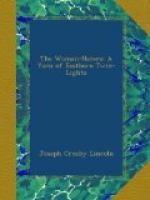“Course I’ll shoe him. But I can’t do it this minute. I’ve got this consarned machine,” waving a hand toward the automobile, “out of door here and all to pieces. And it’s goin’ to rain. Just let me put enough of it together so’s I can shove it into the shop out of the wet, and then I’ll tackle your job. You leave your horse and team here and go do your other errands. He’ll be ready when you come back.”
So on this basis the deal was finally made. Seth was reluctant to trust the precious Joshua out of his sight, but, after some parley, he agreed to do so. The traces were unfastened, and the animal was led into the shop, the carriage was backed under a shed, and the lightkeeper went away promising to be back in an hour. As soon as he had gone, Ellis dived again into the vitals of the auto.
The argument with the blacksmith had one satisfactory result so far as Seth was concerned. In a measure it afforded a temporary vent for his feelings. He was moderately agreeable during his brief stay at the grocery store, and when his orders were given and he found the hour not half over, he strolled out to walk about the village. And then, alone once more, all his misery and heartache returned. He strode along, his head down, scarcely speaking to acquaintances whom he met, until he reached the railway station, where he sat down on the baggage truck to mentally review, over and over again, the scene with Emeline and the dreadful collapse of his newborn hopes and plans.
As he sat there, the door of the station opened and a man emerged, a man evidently not a native of Eastboro. He was dressed in a rather loud, but somewhat shabby, suit of summer plaid, his straw hat was set a trifle over one ear, and he was smoking the stump of a not too fragrant cigar. Altogether he looked like a sporting character under a temporary financial cloud, but the cloud did not dim his self-satisfaction nor shadow his magnificent complaisance. He regarded the section of Eastboro before him with condescending scorn, and then, catching sight of the doleful figure on the baggage truck, strolled over and addressed it.
“I say, my friend,” he observed briskly, “have you a match concealed about your person? If so, I—”
He stopped short, for Mr. Atkins, after one languid glance in his direction, had sprung from the truck and was gazing at him as if he was some apparition, some figure in a nightmare, instead of his blase self. And he, as he looked at the lightkeeper’s astounded countenance, dropped the cigar stump from his fingers and stepped backward in alarmed consternation.
“You—you—you?” gasped Seth.
“You!” repeated the stranger.
“You!” cried Seth again; not a brilliant nor original observation, but, under the circumstances, excusable, for the nonchalant person in the plaid suit was Emeline Bascom’s brother-in-law, the genius, the “inventor,” the one person whom he hated—and feared—more than anyone else in the world—Bennie D. himself.




